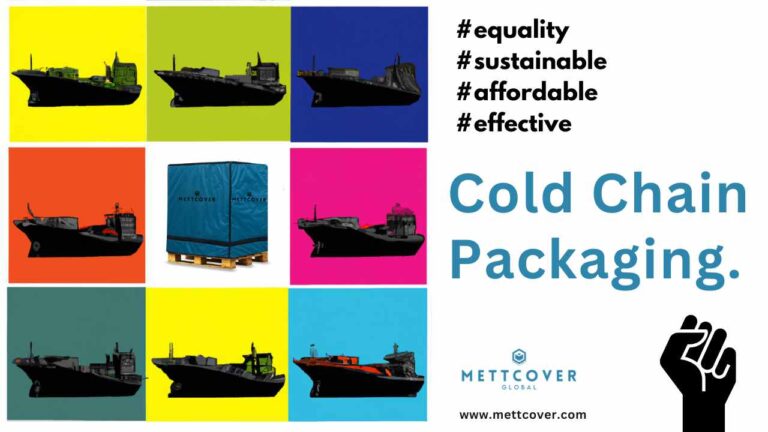Cold Chain Packaging: A Catalyst for Democratizing the Global #SupplyChain
- Mettcover Global

It’s a Democracy and Every #Thermal Cover Counts…
Thermal covers, once considered a luxury reserved for high-value shipments, have become the cornerstone of passive cold chain packaging solutions. The resilience of insulated cold chain packaging is enabling businesses to expand their reach, reduce costs, and ensure the integrity of their products. The resolute capabilities of passive solutions are even more apparent when we consider their impact on the accessibility of vital medications, frozen food shipment-safety and on the ecology. In the not-so-distant past, the exorbitant costs associated with maintaining strict temperature controls during transportation posed a substantial barrier, limiting access to essential medicines and premium frozen food products. However, with the widespread adoption of thermal covers, the paradigm has shifted. The affordability and ease of use of these passive solutions have democratized the cold chain, enabling even small businesses and remote communities to participate in the global marketplace, with minimal logistics challenges and financial burdens.
The riveting exploration of the ever-evolving world of the cold chain industry is nothing less than awe-inspiring. Amongst the transformations that have shaped the cold chain in the past two decades, the extraordinary advancements in passive cold chain solutions stand out significantly. The advent of thermal covers has indeed revolutionized the transportation of temperature-sensitive shipments, making it easier and more cost-effective than ever before. The welcome metamorphosis of the cold chain industry has occurred across its multifaceted components, from cold chain networks and shipping lanes to paradigm shifts in aviation cold chain practices and the utilization of data loggers.
In Cold Chain Management, Colder isn’t always better…
The notion that colder is always better is being challenged by scientific evidence and practical experiences. It is crucial for stakeholders to consider the specific temperature requirements of pharmaceutical products, the impact of solar radiation, and the intricate dynamics of packaging materials. By embracing a more nuanced and scientifically informed approach, the industry can ensure the integrity and efficacy of temperature-sensitive pharmaceutical shipments throughout the entire cold chain journey.
Solar radiation, an often-overlooked factor in packaging, has a significant impact on maintaining precise shipping label temperatures.
The utilization of reusable clear plastic covers, designed to protect pallets from weather and cargo netting abrasion, can inadvertently create a greenhouse effect. Historical practices using white lined corrugate packaging are also undergoing changes as shippers realize the need to factor in solar radiation. The absorption of solar radiation by less expensive brown lined corrugate must be considered in cold chain decisions, further emphasizing the importance of scientific understanding in packaging choices.

Sustainability on a song…
In recent years, sustainability has become the driving force behind cold chain transformations. The virtuoso conductor orchestrating this symphony of sustainability is none other than consumer demand. In response to heightened awareness and concern for the environment, consumers have gravitated towards brands that prioritize sustainable practices.
This seismic shift to sustainability has compelled businesses across the cold chain spectrum to adopt eco-friendly solutions, promote recycling initiatives, and optimize energy consumption.
Survival of the fittest #THERMAL COVER
A central theme emerges amidst the trends and innovations that have defined the cold chain industry: the significance of passive cold chain packaging solutions. Picture this: a mere decade ago, transporting a shipment of life-saving medicines or perishable frozen food items was a herculean task, fraught with challenges and astronomical costs, not to mention the woes of using a Styrofoam box with liquid gel packs. The introduction of thermal covers has altered this landscape forever, empowering businesses to transport temperature-sensitive goods with unprecedented ease, efficiency, and affordability. Thermal covers allow agility to accommodate many customer demands and cold chain network conditions. Their adaptive features have become the cornerstone of passive cold chain solutions. These innovative covers have the remarkable ability to maintain the desired temperature range for extended periods. They act as an impenetrable shield, protecting fragile pharmaceuticals and delicate frozen food items from temperature excursions that could render them ineffective or spoiled.
The resilience of thermal covers has reshaped the cold chain industry, enabling businesses to expand their reach, reduce costs, and ensure the integrity of their products.
Within this ecosystem, the pharmaceutical industry stands tall as a powerhouse, demanding stringent cold chain protocols to safeguard the efficacy of life-saving medications. From research labs to manufacturing facilities, from distribution centers to the doorstep of patients, the cold chain ensures that pharmaceuticals reach their intended recipients in pristine condition. Passive cold chain solutions have emerged as a game-changer in maintaining precise shipping label temperatures. By leveraging the manufacturing innovations, passive solutions are revolutionizing temperature control during pharmaceutical shipments. Let us explore some key advancements in this field.
Cold Chain Validation Studies:
Passive cold chain management is not limited to theoretical assumptions but is backed by scientific validation studies. These studies involve comprehensive testing of thermal packaging solutions under different temperature profiles to ensure optimal performance. By simulating real-world scenarios and conducting rigorous testing, passive cold chain management provides robust data-driven insights into maintaining precise shipping label temperatures.
Thermal Stability during Tarmac Delays:
Tarmac delays, where pharmaceutical shipments may be exposed to extreme heat or freezing temperatures, can jeopardize the integrity of the products. Passive cold chain innovations focus on enhancing thermal stability during such delays. Thermal packaging materials with extended insulation capabilities and temperature-regulating features help mitigate the impact of prolonged tarmac delays, ensuring that the desired temperature range is maintained.
Advanced Thermal Packaging Materials:
One crucial aspect of passive cold chain management is the development of highly efficient thermal packaging materials. These materials are designed to provide excellent insulation properties and minimize temperature fluctuations throughout the transportation process. Advanced insulated packaging offers enhanced protection against external factors such as ambient heat, extreme cold, and temperature gradients, ensuring that pharmaceutical products remain within the desired temperature range throughout the transit or while in storage.

Overcoming Challenges in Difficult Shipping Lanes:
Difficult shipping lanes present a mix of challenges that can compromise the integrity of temperature-sensitive pharmaceutical shipments. Extreme weather conditions, extended transit times, and inadequate infrastructure pose significant risks. However, passive cold chain solutions are designed to overcome these challenges and ensure the maintenance of precise shipping label temperatures.
The success script is co-authored by Temperature Monitoring Systems:
Accurate and real-time temperature monitoring is essential in ensuring the integrity of pharmaceutical shipments. Passive cold chain solutions incorporate advanced temperature monitoring systems that utilize IoT (Internet of Things) technology and wireless sensors. These systems continuously monitor and record temperature data during transit, providing valuable insights into any temperature excursions. This proactive approach allows stakeholders to take prompt corrective actions to maintain precise shipping label temperatures. In practice, single-use data loggers remain a popular choice of pharmaceutical logistics professionals. The devices can monitor temperature excursions throughout the transit with an accuracy of +/- 0.5 °C, are cost-effective, and come with a superb feature of PDF-ready reports, via USB connectivity.
Adapting to Diverse Temperature Profiles:
Pharmaceutical shipments often encounter diverse temperature profiles throughout their journey. From freezing temperatures to ambient cool and cold temperature environments, maintaining the desired temperature range becomes a complex task. Passive cold chain management offers innovative solutions to adapt to these diverse temperature profiles effectively. The validation reports and feedback from the industry readily indicate that Thermal Covers can maintain the cold chain temperature profiles with a high success rate, thereby significantly reducing spillage.
Customized Thermal Packaging Solutions:
To ensure precise shipping label temperatures, passive cold chain management utilizes customized thermal packaging solutions tailored to specific temperature requirements. These covers can be custom-made, incorporated with advanced insulation materials and temperature-regulating technologies to counter the effects of varying temperature profiles.
By adapting to freezing, ambient cool, and cold temperature environments, insulated packaging solutions maintain product stability throughout the journey. Thermal Covers also resolve the diversity of pallet sizes and ULD covers as they can be manufactured in over 100+ custom sizes.
The Future Looks Good…
The evolution of passive cold chain management is reshaping the pharmaceutical logistics landscape. Stakeholders now negate the traditional notion that colder temperatures are always better. Passive cold chain management offers a scientific and mature approach to maintaining precise shipping label temperatures. With a focus on overcoming challenges in difficult shipping lanes and addressing tarmac delays, passive cold chain management empowers the industry to ensure the integrity and efficacy of temperature-sensitive pharmaceutical shipments. As the field continues to evolve, it is crucial to embrace these innovations and harness their potential for a more robust and reliable cold chain.





